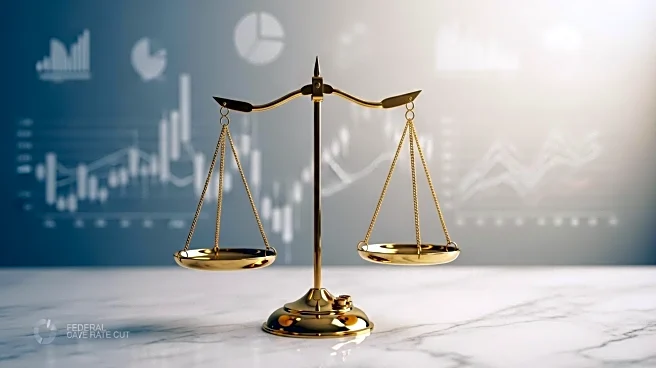What's Happening?
The U.S. dollar experienced a decline on Monday following a weak jobs report released last Friday, which has heightened expectations for a Federal Reserve rate cut. The non-farm payrolls report indicated a significant drop in U.S. job growth for August, with the unemployment rate rising to a nearly four-year high of 4.3%. This development has led to speculation that the Federal Reserve will reduce interest rates at its upcoming policy meeting. Fed funds futures are currently pricing in a 90% chance of a standard 25 basis-point cut and a 10% chance of a 50-basis-point reduction. The dollar's decline is also influenced by political uncertainty in Japan, where Prime Minister Shigeru Ishiba announced his resignation, affecting the yen's value.
Why It's Important?
The anticipated rate cut by the Federal Reserve is significant as it reflects the central bank's response to economic indicators suggesting a slowdown in job growth. A reduction in interest rates could stimulate economic activity by making borrowing cheaper, potentially benefiting businesses and consumers. However, it also signals concerns about the U.S. economy's health, which could impact investor confidence and market stability. The political uncertainty in Japan adds another layer of complexity, affecting global currency markets and potentially influencing international trade dynamics.
What's Next?
The Federal Reserve's decision on interest rates is expected later this month, with market participants closely monitoring any signals from the central bank. Additionally, the political situation in Japan may lead to changes in fiscal and monetary policy, depending on the new leadership. Investors will be watching for any developments that could affect currency values and global economic conditions.
Beyond the Headlines
The broader implications of the Federal Reserve's potential rate cut include discussions about its independence and the Trump administration's influence over monetary policy. President Trump has been critical of Fed Chair Jerome Powell for not cutting rates sooner, and there are ongoing considerations about replacing him. This situation raises questions about the balance between political influence and economic decision-making within the U.S.









